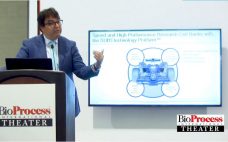Michelle Zengh, chief operating officer, MabPlex International Company Ltd. MabPlex presents a complete solution from gene cloning to antibody–drug conjugate (ADC) fill–finish with a timeline from gene cloning to an investigational new drug application (IND) in 22 months. The company has facilities in San Diego and in China. It can perform cloning and high-yield stable cell-line development, process development and scale-up, CGMP quality and kilogram-scale monoclonal antibody (MAb) and payload manufacturing, large-scale conjugation (150–500 L), large-scale purification, formulation, and fill–finish.…
BPI Theater
BioProcess Insider BPI Theater @ BIO 2018 – Wednesday Interviews
BioProcess Insider brings the news as it breaks. At the BPI Theater @ BIO, editor Dan Stanton conducted a series of interviews live on stage to report on the latest movements in the biomanufacturing industry to start each busy day of dealmaking in Boston. Below we summarize and share the videos from his DAY TWO conversations with a number of biopharmaceutical executives on Wednesday 6 June 2018. Sean Sommer, Vice President of Advanced Facilities, Jacobs Jacobs offers a range of services…
Rapid, Reliable Response to Biologic Drug Substance and Drug-Product Supply Challenges
Scott Battist, vice president, general manager, and site head for the drug substance plant, Emergent Bio BJ Hull, vice president, general manager, and site head for the drug product plant, Emergent Bio Willfredo Mateo, director of MS&T for the Camden fill–finish plant, Emergent Bio Emergent Bio started by producing treatments for an anthrax emergency. Traditionally, this has been a biodefense company with contracts from the US government. The company is focused on providing specialty products for civilians and military members…
Speed Matters: Gene to GMP in Nine Months
Igor Fisch, chief executive officer, Selexis, SA Fisch first posed this question: “How can we accelerate the number of drugs going into the clinics?” Speed matters because the faster a drug can get into clinical testing, the faster it can make it to market. He discussed both Selexis and KBI Biopharma and their collaboration, which started in 2012 when KBI developed a heterodimer purification process. JSR acquired both companies with an interest in entering the life sciences business. Selexis has…
Thinking Outside the Bag: Single-Use Technology Can Drive Innovation at the Benchtop Scale
Cristy Botens, product manager in bioprocessing, Distek Innovation is important, Botens began, and the focus should be on patients. Every innovation means that medicine gets to patients faster or has fewer side-effects. Recent pharmaceutical innovations include the first new Lupus treatment approved in 50 years, a gene therapy cure for inherited blindness, gene therapies for rare diseases, new chimeric antigen receptors on T cells (CAR-T) clinical trials (over 180 trials now), personalized cell therapy, and a vaccine that prevents cervical…
It’s All About Speed: Getting to Early Development Clinical Trials Quickly
David J. Kenyon, senior director of global scientific and technical affairs, Patheon (Thermo Fisher Scientific) Kenyon has over 25 years of experience in the pharmaceutical/biotechnology and vaccine industries. He began his career with Johnson and Johnson, where he managed the production of the first monoclonal antibody (MAb) approved for human therapy. He joined Patheon in 2014. Kenyon received his PhD from the Rutgers School of Medicine and Dentistry of New Jersey. Patheon is now part of Thermo Fisher Scientific. Thermo…
Using New Technologies to Compress Timelines, Increase Capacity, and Reduce Costs: Speed — Why, When, and How
Moderator Tom Ransohoff, with Jorg Thommes, Chris Love, Rajesh Beri, and Geoffrey Hodge For biopharmaceuticals to mature as a process industry, companies need to embrace the ability to adopt new technologies and bring new operational approaches to their biomanufacturing facilities. In this roundtable about adopting and implementing new technologies in the biologics industry, moderator Tom Ransohoff stressed the importance of understanding drivers for adopting new technologies and of developing enabling processes that factor in associated risks and challenges. He offered…
Capacity Strategies: The Strategies Behind Choosing Between Large-Scale and Single-Use Investments
Moderator Dan Stanton, with Weichang Zhou, Jenifer Wheat, Roger Lias, and Jim Vogel Single-use technologies (SUTs) are now prevalent within bioprocessing, but does this spell the end of industry’s historic reliance on stainless steel and fixed facilities? This roundtable was formed to discuss the wealth of investment in single-use (SU) equipment and flexible manufacturing solutions by contract development and manufacturing organizations (CDMOs) over the past few years, pitting that against what looks like a resurgence in fixed-cost stainless steel plants…
Emerging Technologies and Strategies to Accelerate Process Development and Time to Market
Gustavo Mahler, president and chief executive officer, AGC Biologics AGC Biologics is one of the largest global biologics contract development and manufacturing organizations (CDMO) specializing in clinical and commercial development of therapeutic proteins. It has developed more than 200 products, both mammalian and microbial, from preclinical to commercial on all scales. The company’s CGMP facilities are located in the United States, Europe, and Japan. AGC Biologics’s technologies and strategies to accelerate time to market include standardized cell-line and cell-bank creation…
Future-Proofing and Understanding Your Molecule with Contemporary Analytics and Formulation Approaches
Greg Adams, senior director of global analytical strategy and development, Fujifilm Diosynth Biotechnologies (FDB) “Proteins have personalities.” Adams began. Their three-dimensional structures and folding patterns influence how each protein will behave. Analytical methods that evaluate a protein’s quality attributes need to be reproducible and robust. Proteins are evaluated through elucidating their amino acid sequences, using molecular informatics and modeling, characterizing three-dimensional structures, and understanding the degree of posttranslational modifications. The resulting knowledge will help you ensure consistency and safeguard methods.…










